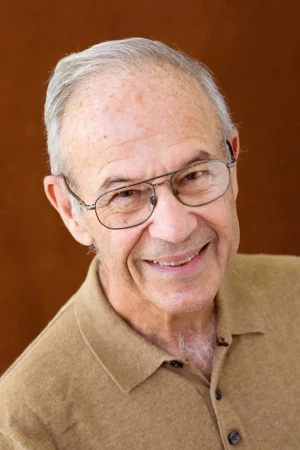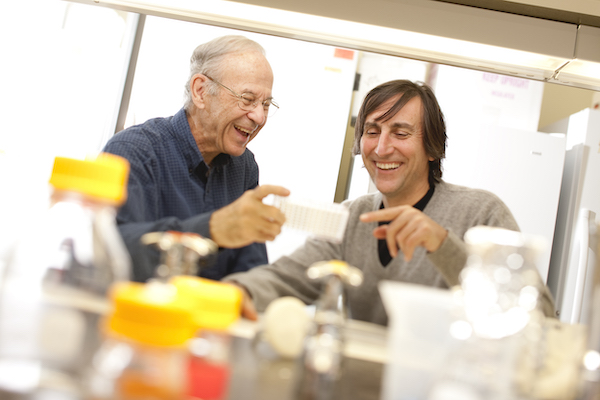
LA JOLLA, CA—Dr. Howard Grey, former President and Scientific Director of La Jolla Institute for Immunology (LJI), has died in Denver. He was 87 years old.
Grey, a highly respected biochemist and a pioneering immunologist with a reputation for offering unadorned insight, defined how T cells recognize their targets. He took over as Scientific Director and third President of LJI after the retirement of Dr. Kimishige Ishizaka in 1996. Over the next seven years, Grey would strengthen LJI’s ties with business partners, expand the faculty from six to 14 members, and initiate plans to move the Institute to LJI’s current home in UC San Diego’s Research Park. When he retired as CEO in 2003, he continued to be involved in immunological research at LJI until 2015.
“In the 60’s, at a time before proteins could be sequenced, Howard was a pioneer in studying the structure of B cell immunoglobulins,” said LJI President and Chief Scientific Officer Mitchell Kronenberg, whom Grey recruited as a faculty member to LJI in 1997. “Later, seminal and widely acclaimed work showed how the T cell receptor recognized fragments of proteins, or peptides. His formidable biochemical skills drove achievements in both areas.”
Born in New York City, Grey earned a BA in Chemistry in 1953 from the University of Pennsylvania and then attended medical school, earning an MD from New York University and interning at Johns Hopkins. In 1958, however, he moved from the clinic to fundamental research and began a 6-year research fellowship studying antigen-antibody interactions, first at University of Pittsburgh and then at the Scripps Clinic and Research Foundation in La Jolla. He was mentored in those early years by Dr. Frank Dixon, who later became well known for leading the Scripps Research Institute. He then relocated to Rockefeller University as an investigator and assistant professor in the mid-60’s and then back to Scripps in 1967, investigating the structure of gamma-globulins.
In 1970, Grey joined the faculty of the University of Colorado Medical Center in Denver, where he began two decades of high impact research, served as Head of the Basic Immunology Division from 1978 – 1988, and expanded his interests to include T cell activation. With his lab housed in the Department of Medicine at Denver’s National Jewish Hospital and Research Center, a mecca for immunology research, Grey was one of a group of trail-blazing immunologists who postulated that for T cells to respond to a pathogen, a T cell receptor must bind short fragments of pathogen proteins that presented or captured by so called major histocompatibility (MHC) proteins expressed on the surface of the target cells.
In the late 70’s, those ideas were controversial, in part because the structure of the T cell receptor was unclear. Some even proposed there were two distinct T cell receptors, one recognizing MHC proteins and the other binding antigen. By 1983, however, Grey, collaborating with next-door lab neighbors John Kappler and Philippa Marrack, had proven that protein antigens must be chopped up or “processed” into short fragments, or peptides, to activate T cells. And in 1986 and 1987, respectively, Grey’s group published seminal papers in the Proceedings of the National Academy of Sciences and Science leaving no doubt that peptide antigens must be presented in the grasp of MHC proteins to activate what was now known to be a single T cell receptor.
Grey then moved on to answer multiple biochemical questions relevant to the “ligand end” of T cell activation, for example showing in a 1988 Science paper how a single MHC molecule can present multiple types of peptide antigens in a specific manner. Grey’s contributions over this highly productive period of his career would earn him prestigious awards in the late 80’s and 90’s, including being named co-winner of the William B Coley Award for distinguished research in basic and tumor immunology and culminating in membership in the National Academy of Sciences in 1999.
In 1988, Grey left Colorado to co-found the San Diego biotechnology company Cytel, in part to realize his work’s clinical potential by creating and testing novel peptide drugs that modulate the immune system, some to build better vaccines and others intended to dampen immune responses in autoimmune disease. Grey remained the company’s Vice President for Research and Development until 1994, when he moved to LJI to become division head of Immunochemistry and, in 1996, LJI President.
His accomplishments at LJI prove that a successful scientist can also have business acumen. “In addition to recruiting outstanding up and coming faculty, Howard initiated important discussions with our long-term business partners at Kirin, encouraging them to support our move in 2006 to a state-of-the-art facility on the UCSD campus,” said Kronenberg. “Howard solidified our relationship by fostering interactions of Kirin’s scientists with our own, strengthening our partnership and securing support for our research.”
Grey’s communication style, however, was hardly that of a smooth-operating corporate executive. He was renowned among some as being taciturn to the point of intimidating. “I’d give him 90 out of 100 on the laconic scale,” says Kronenberg, “but what he did say, was almost always highly important.”

LJI professor Alessandro Sette, Dr. Biol. Sci., who did postdoctoral work in Grey’s lab and later followed him to Cytel, agrees but says that Grey’s no-nonsense demeanor was something that attracted excellent scientists into his orbit. “He was a man of few words and valued direct communication in a work environment over niceties and political correctness,” says Sette, “but when Howard said something, you could hang your hat on it.”
Most who knew Grey agree that his occasional brusqueness reflected very high standards he set for himself and others. “He expected you to drop a hypothesis if it was not supported by experiments, something he was equally ready to do,” says Sette.
Grey stepped down as LJI CEO in 2003 and at age 71 and assumed a part-time position in LJI’s Division of Vaccine Development working with Sette, his former post-doc who had since joined the faculty. “Howard remained in my lab another 10 years as a partner and key contributor in driving grants and mentoring young students and postdocs,” says Sette, who worked with Grey for almost 30 years. “He was my most influential mentor and one of the smartest people I ever met.”
Grey served as LJI President Emeritus until his death.
Howard Grey is survived by his wife Hilda, two of his three children, Allen and Stuart Grey, and seven grandchildren.
A service will be held at 1 pm on January 4, 2020, at Olinger Chapel Hill, 6601 South Colorado Boulevard, Denver, Colorado 80129.



